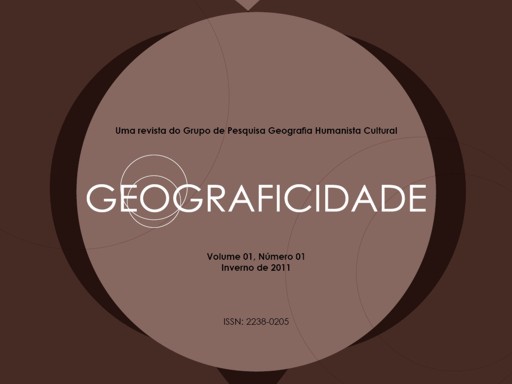Espaço, tempo, lugar: um arcabouço humanista / Space, time, place: a humanistic frame
DOI:
https://doi.org/10.22409/geograficidade2011.11.a12804Palabras clave:
pensamento geográfico, geosofia, Geografia HumanistaResumen
Espaço e tempo são ideias que possuem significados muito variados em diferentes campos do conhecimento e na vida cotidiana. É mais comum associarmos espaço e lugar do que espaço e tempo, pelo menos no dia-a-dia. Na imaginação é fácil tratar espaço, tempo e lugar separadamente. Na experiência vivida eles estão indissoluvelmente ligados. Este artigo objetiva mostrar como o tempo está presente nos conceitos de espaço e de lugar em diferentes escalas, em direção à relação tempo-lugar na experiência humana.Descargas
Citas
ARNHEIM, R. Art and visual perception: a psychology of the creative eye. Berkely: University of California, 1965.
ASCHOOF, J. Circidian rythms in man. Science, 148, p. 1427-1432, 1965.
BERNDT, R. M.; BERNDT, C. M. Man, land and myth in North Australia: the Gunwinggu people. East Lansing: Michingan State University, 1970.
COX, H. The secular city: secularization and urbanization int technological perspective. Londres: SCM, 1966.
DODDS, E. R. Pagan and Christian in an age of anxiety. Cambridge: Cambridge University, 1965.
EBERHARD, W. Conquerors and rulers. Leiden: Brill, 1965.
FORK, A. The world conception of the chinese. Londres: Arthur Probethain, 1925.
GRANET, M. La pensée chinoise. Paris: Albin Michel, 1934.
GUÉNON, R. Le Roidu monde. Paris: Traditionelles, 1950.
HALLOWELL, A. I. Culture and experience. Nova Iorque: Schocken, 1967.
LEACH, E. Two essays concerning the symbolici representation of time. In: Rethinking Anthropology. Londres: Athlone, 1966. p. 124-136.
LEWIS, C. S. The discarded image. Cambridge: Cambridge University, 1964.
LOWENTHAL, D. Past time, present place: landscape and memory. Geographical Review, 65, p. 1-36, 1975.
LYNCH, K. What time in this place? Cambridge: MIT, 1972.
MINKOWSKI, E. Lived time. Evanston: Northwestern University, 1970.
NEIHARDT, J. G. Black elk speaks. Nebraska: Bison, 1961.
OGDEN, J. T. From spatial to aesthetic distance in the eighteenth century. Journal of the history ideas, 35, p. 63-78, 1974.
RAMSEY, A. M. Sacred and secular. Nova Iorque: Marker and Row, 1965.
RUSSELL, J. L. Time in christian thought. In: FRASER, J. T. (org.) The Voices of Time: a cooperative survey of man's views of time as expressed by the sciences and by the humanities. Nova Iorque: george Braziller, 1968. p. 59-76.
SANTMYER, H. H. Ohio town. Columbus: Ohio State University, 1962.
SOOTHILL, W. E. The hall of the light. Londres: Lutherworth, 1951.
SREHLOW, T. G. R. Aranda Tradition. Melbourne: Melbourne University, 1947.
STRAUS, E. The primary world of the senses. Nova Iorque: Free Press of Glencoe, 1963.
WHITE, L. A. The world of the Keresan Pueblo Indians. In: DIAMOND, S. Primitive views of the world. Nova Iorque: Columbia University, 1964. p. 83-94
WU, N. I. Chinese and indian architecture. Nova Iorque: Braziller, 1963.
YOUNG, M.; WILMOTT, P. The symmetrical family. Londres: Routledge; Kegan Paul/Nova Iorque: Pantheon, 1973.


